Reflection on the US Independence Declaration & its Context
VerifiedAdded on 2023/04/26
|5
|926
|328
Essay
AI Summary
This essay provides an analysis of the United States Declaration of Independence, exploring its historical context, philosophical underpinnings, and enduring influence. It examines the document's origins in a series of philosophical, historical, and political frameworks, highlighting its articulation of grievances against British colonial policy and its assertion of fundamental rights, including life, liberty, and the pursuit of happiness. The essay discusses the Declaration's reliance on natural law principles, emphasizing the equality of all individuals and their entitlement to unalienable rights. Furthermore, it reflects on the document's role in inspiring movements for independence and self-governance worldwide, as well as its continued relevance to contemporary issues of government and individual liberty.
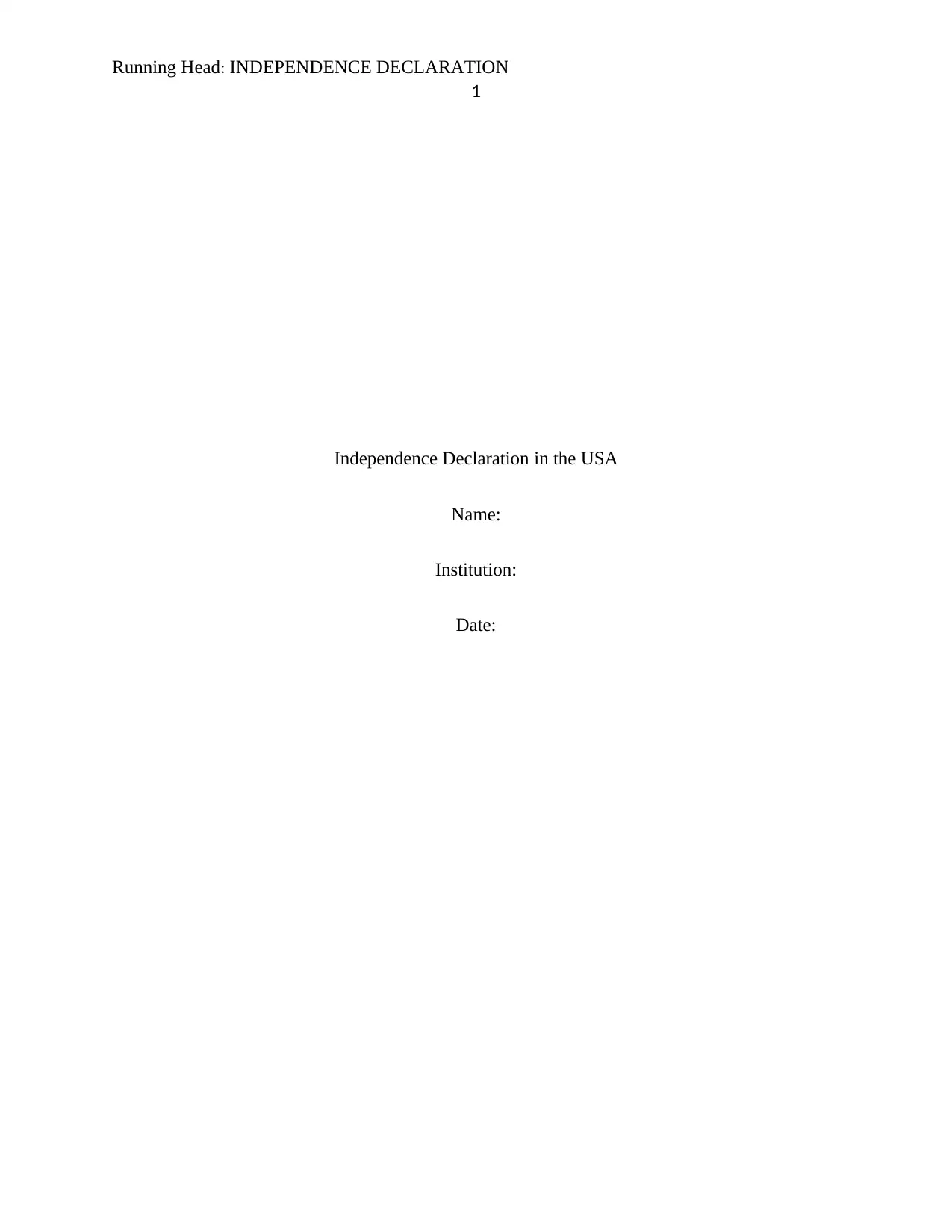
Running Head: INDEPENDENCE DECLARATION
1
Independence Declaration in the USA
Name:
Institution:
Date:
1
Independence Declaration in the USA
Name:
Institution:
Date:
Paraphrase This Document
Need a fresh take? Get an instant paraphrase of this document with our AI Paraphraser
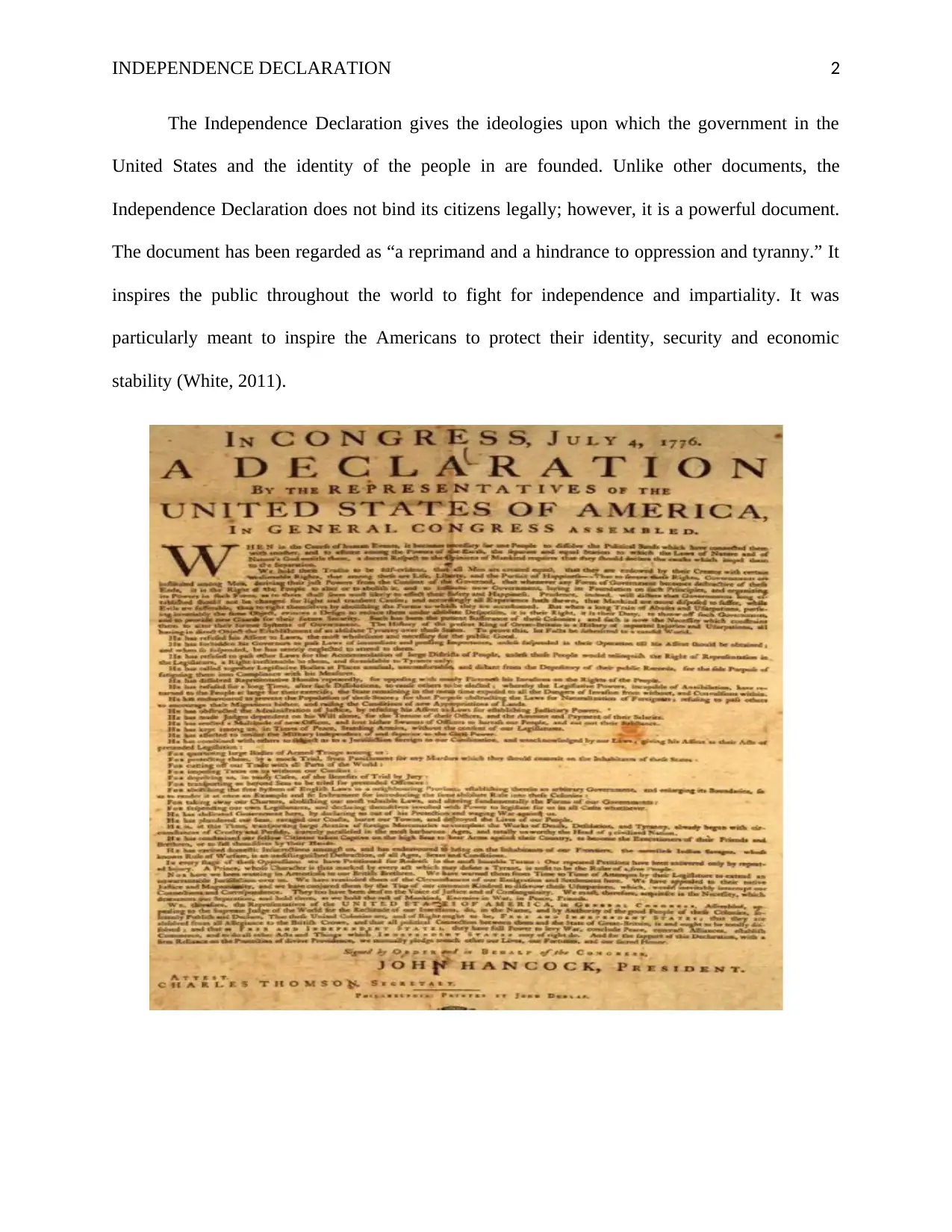
INDEPENDENCE DECLARATION 2
The Independence Declaration gives the ideologies upon which the government in the
United States and the identity of the people in are founded. Unlike other documents, the
Independence Declaration does not bind its citizens legally; however, it is a powerful document.
The document has been regarded as “a reprimand and a hindrance to oppression and tyranny.” It
inspires the public throughout the world to fight for independence and impartiality. It was
particularly meant to inspire the Americans to protect their identity, security and economic
stability (White, 2011).
The Independence Declaration gives the ideologies upon which the government in the
United States and the identity of the people in are founded. Unlike other documents, the
Independence Declaration does not bind its citizens legally; however, it is a powerful document.
The document has been regarded as “a reprimand and a hindrance to oppression and tyranny.” It
inspires the public throughout the world to fight for independence and impartiality. It was
particularly meant to inspire the Americans to protect their identity, security and economic
stability (White, 2011).
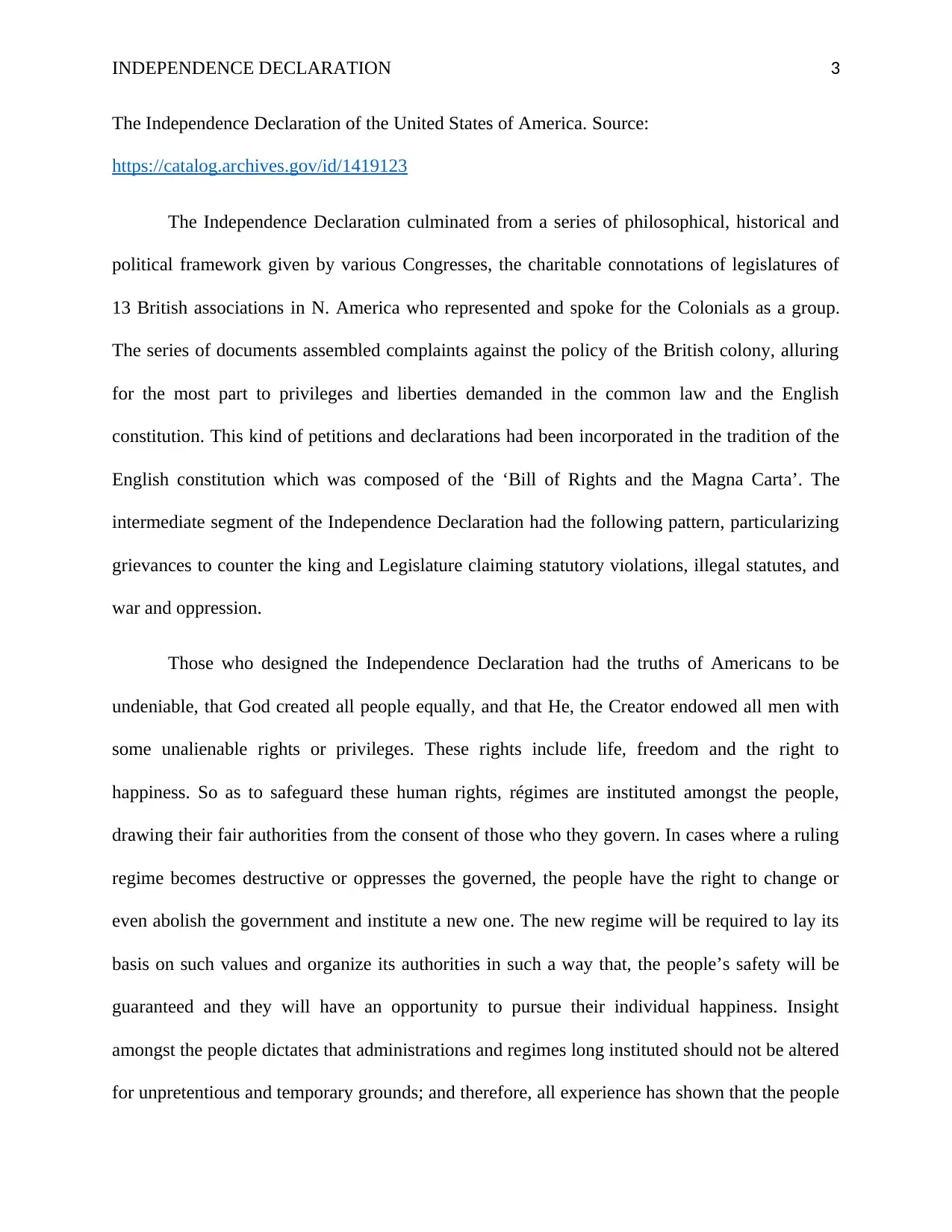
INDEPENDENCE DECLARATION 3
The Independence Declaration of the United States of America. Source:
https://catalog.archives.gov/id/1419123
The Independence Declaration culminated from a series of philosophical, historical and
political framework given by various Congresses, the charitable connotations of legislatures of
13 British associations in N. America who represented and spoke for the Colonials as a group.
The series of documents assembled complaints against the policy of the British colony, alluring
for the most part to privileges and liberties demanded in the common law and the English
constitution. This kind of petitions and declarations had been incorporated in the tradition of the
English constitution which was composed of the ‘Bill of Rights and the Magna Carta’. The
intermediate segment of the Independence Declaration had the following pattern, particularizing
grievances to counter the king and Legislature claiming statutory violations, illegal statutes, and
war and oppression.
Those who designed the Independence Declaration had the truths of Americans to be
undeniable, that God created all people equally, and that He, the Creator endowed all men with
some unalienable rights or privileges. These rights include life, freedom and the right to
happiness. So as to safeguard these human rights, régimes are instituted amongst the people,
drawing their fair authorities from the consent of those who they govern. In cases where a ruling
regime becomes destructive or oppresses the governed, the people have the right to change or
even abolish the government and institute a new one. The new regime will be required to lay its
basis on such values and organize its authorities in such a way that, the people’s safety will be
guaranteed and they will have an opportunity to pursue their individual happiness. Insight
amongst the people dictates that administrations and regimes long instituted should not be altered
for unpretentious and temporary grounds; and therefore, all experience has shown that the people
The Independence Declaration of the United States of America. Source:
https://catalog.archives.gov/id/1419123
The Independence Declaration culminated from a series of philosophical, historical and
political framework given by various Congresses, the charitable connotations of legislatures of
13 British associations in N. America who represented and spoke for the Colonials as a group.
The series of documents assembled complaints against the policy of the British colony, alluring
for the most part to privileges and liberties demanded in the common law and the English
constitution. This kind of petitions and declarations had been incorporated in the tradition of the
English constitution which was composed of the ‘Bill of Rights and the Magna Carta’. The
intermediate segment of the Independence Declaration had the following pattern, particularizing
grievances to counter the king and Legislature claiming statutory violations, illegal statutes, and
war and oppression.
Those who designed the Independence Declaration had the truths of Americans to be
undeniable, that God created all people equally, and that He, the Creator endowed all men with
some unalienable rights or privileges. These rights include life, freedom and the right to
happiness. So as to safeguard these human rights, régimes are instituted amongst the people,
drawing their fair authorities from the consent of those who they govern. In cases where a ruling
regime becomes destructive or oppresses the governed, the people have the right to change or
even abolish the government and institute a new one. The new regime will be required to lay its
basis on such values and organize its authorities in such a way that, the people’s safety will be
guaranteed and they will have an opportunity to pursue their individual happiness. Insight
amongst the people dictates that administrations and regimes long instituted should not be altered
for unpretentious and temporary grounds; and therefore, all experience has shown that the people
⊘ This is a preview!⊘
Do you want full access?
Subscribe today to unlock all pages.

Trusted by 1+ million students worldwide
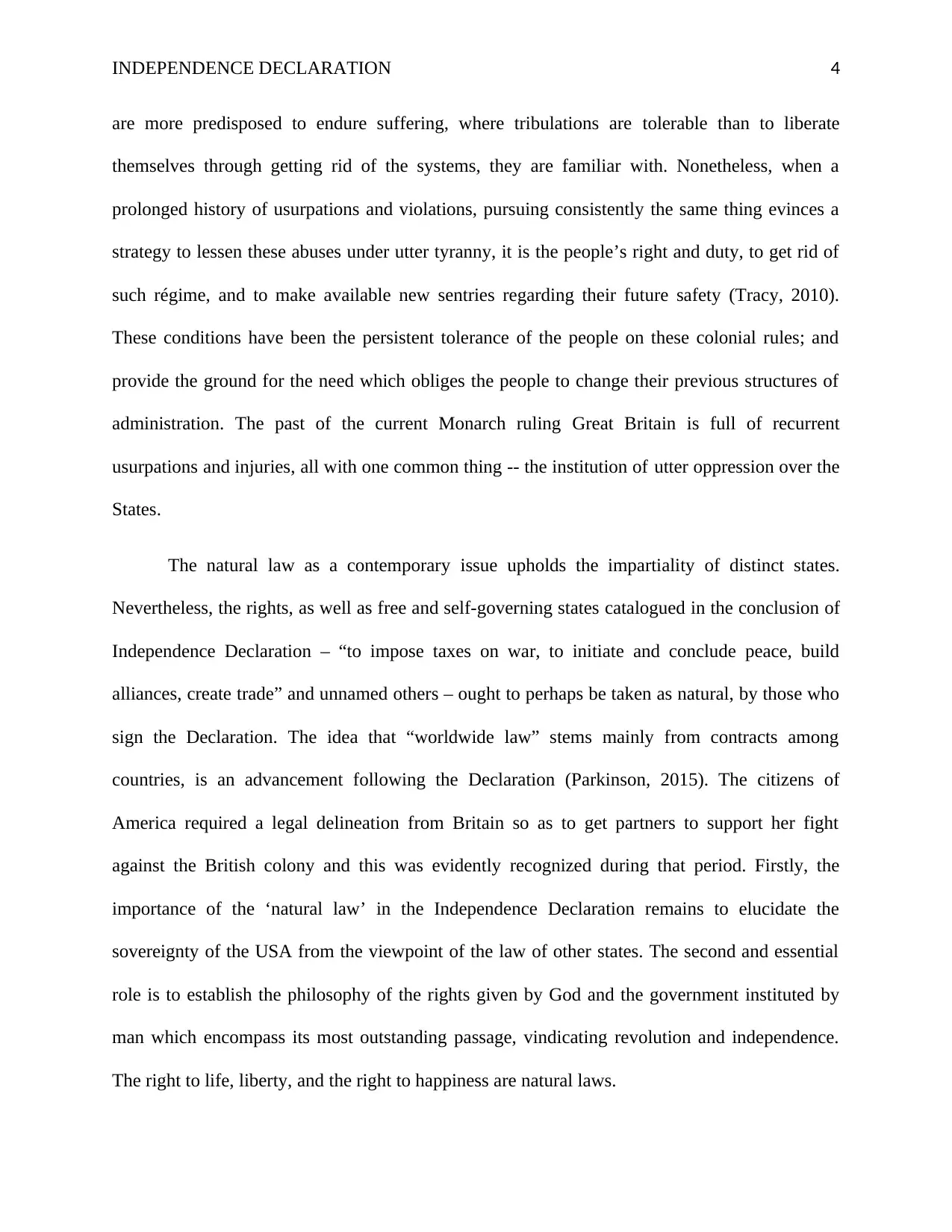
INDEPENDENCE DECLARATION 4
are more predisposed to endure suffering, where tribulations are tolerable than to liberate
themselves through getting rid of the systems, they are familiar with. Nonetheless, when a
prolonged history of usurpations and violations, pursuing consistently the same thing evinces a
strategy to lessen these abuses under utter tyranny, it is the people’s right and duty, to get rid of
such régime, and to make available new sentries regarding their future safety (Tracy, 2010).
These conditions have been the persistent tolerance of the people on these colonial rules; and
provide the ground for the need which obliges the people to change their previous structures of
administration. The past of the current Monarch ruling Great Britain is full of recurrent
usurpations and injuries, all with one common thing -- the institution of utter oppression over the
States.
The natural law as a contemporary issue upholds the impartiality of distinct states.
Nevertheless, the rights, as well as free and self-governing states catalogued in the conclusion of
Independence Declaration – “to impose taxes on war, to initiate and conclude peace, build
alliances, create trade” and unnamed others – ought to perhaps be taken as natural, by those who
sign the Declaration. The idea that “worldwide law” stems mainly from contracts among
countries, is an advancement following the Declaration (Parkinson, 2015). The citizens of
America required a legal delineation from Britain so as to get partners to support her fight
against the British colony and this was evidently recognized during that period. Firstly, the
importance of the ‘natural law’ in the Independence Declaration remains to elucidate the
sovereignty of the USA from the viewpoint of the law of other states. The second and essential
role is to establish the philosophy of the rights given by God and the government instituted by
man which encompass its most outstanding passage, vindicating revolution and independence.
The right to life, liberty, and the right to happiness are natural laws.
are more predisposed to endure suffering, where tribulations are tolerable than to liberate
themselves through getting rid of the systems, they are familiar with. Nonetheless, when a
prolonged history of usurpations and violations, pursuing consistently the same thing evinces a
strategy to lessen these abuses under utter tyranny, it is the people’s right and duty, to get rid of
such régime, and to make available new sentries regarding their future safety (Tracy, 2010).
These conditions have been the persistent tolerance of the people on these colonial rules; and
provide the ground for the need which obliges the people to change their previous structures of
administration. The past of the current Monarch ruling Great Britain is full of recurrent
usurpations and injuries, all with one common thing -- the institution of utter oppression over the
States.
The natural law as a contemporary issue upholds the impartiality of distinct states.
Nevertheless, the rights, as well as free and self-governing states catalogued in the conclusion of
Independence Declaration – “to impose taxes on war, to initiate and conclude peace, build
alliances, create trade” and unnamed others – ought to perhaps be taken as natural, by those who
sign the Declaration. The idea that “worldwide law” stems mainly from contracts among
countries, is an advancement following the Declaration (Parkinson, 2015). The citizens of
America required a legal delineation from Britain so as to get partners to support her fight
against the British colony and this was evidently recognized during that period. Firstly, the
importance of the ‘natural law’ in the Independence Declaration remains to elucidate the
sovereignty of the USA from the viewpoint of the law of other states. The second and essential
role is to establish the philosophy of the rights given by God and the government instituted by
man which encompass its most outstanding passage, vindicating revolution and independence.
The right to life, liberty, and the right to happiness are natural laws.
Paraphrase This Document
Need a fresh take? Get an instant paraphrase of this document with our AI Paraphraser
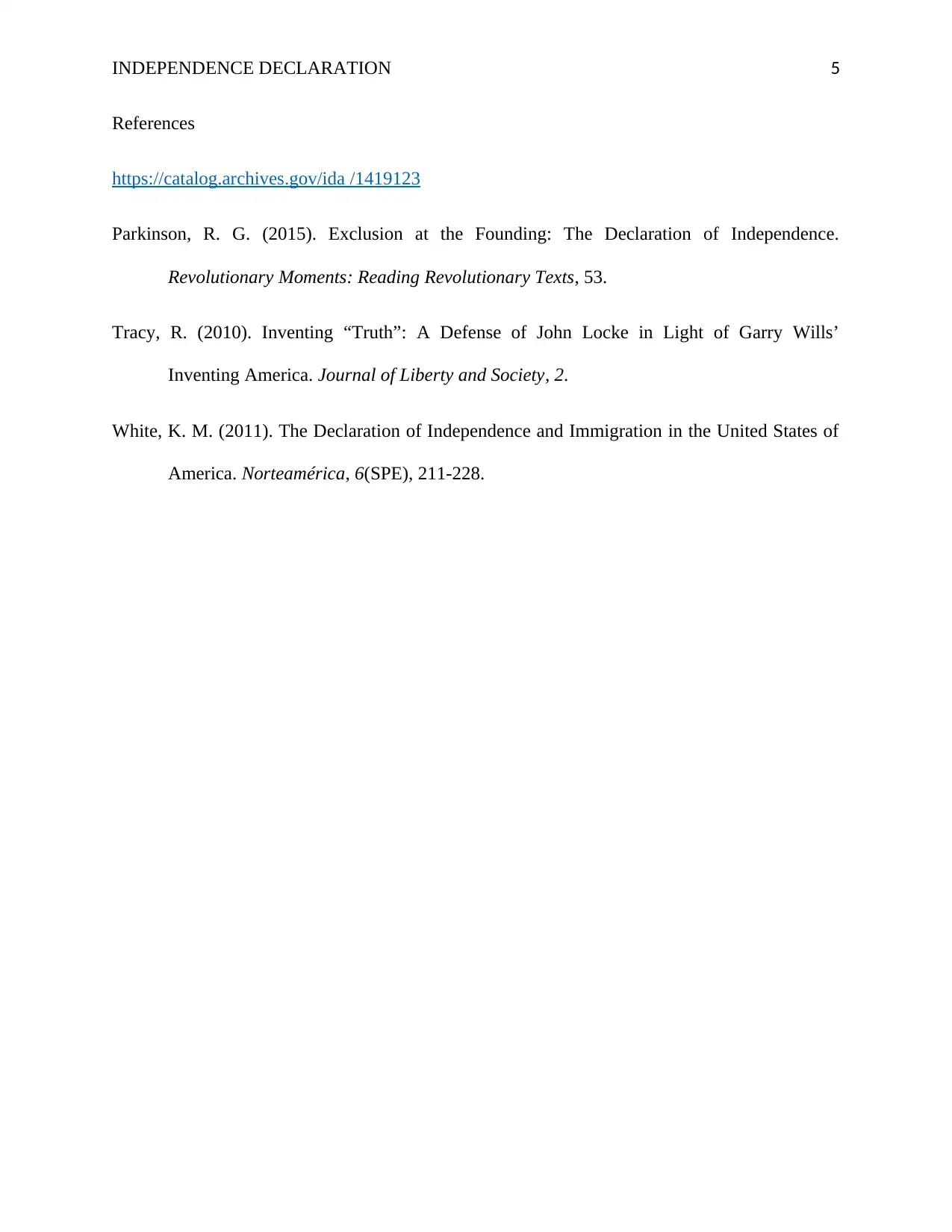
INDEPENDENCE DECLARATION 5
References
https://catalog.archives.gov/ida /1419123
Parkinson, R. G. (2015). Exclusion at the Founding: The Declaration of Independence.
Revolutionary Moments: Reading Revolutionary Texts, 53.
Tracy, R. (2010). Inventing “Truth”: A Defense of John Locke in Light of Garry Wills’
Inventing America. Journal of Liberty and Society, 2.
White, K. M. (2011). The Declaration of Independence and Immigration in the United States of
America. Norteamérica, 6(SPE), 211-228.
References
https://catalog.archives.gov/ida /1419123
Parkinson, R. G. (2015). Exclusion at the Founding: The Declaration of Independence.
Revolutionary Moments: Reading Revolutionary Texts, 53.
Tracy, R. (2010). Inventing “Truth”: A Defense of John Locke in Light of Garry Wills’
Inventing America. Journal of Liberty and Society, 2.
White, K. M. (2011). The Declaration of Independence and Immigration in the United States of
America. Norteamérica, 6(SPE), 211-228.
1 out of 5
Your All-in-One AI-Powered Toolkit for Academic Success.
+13062052269
info@desklib.com
Available 24*7 on WhatsApp / Email
![[object Object]](/_next/static/media/star-bottom.7253800d.svg)
Unlock your academic potential
Copyright © 2020–2026 A2Z Services. All Rights Reserved. Developed and managed by ZUCOL.


